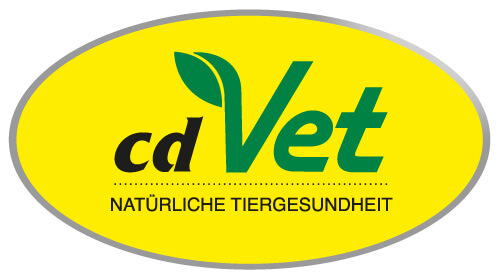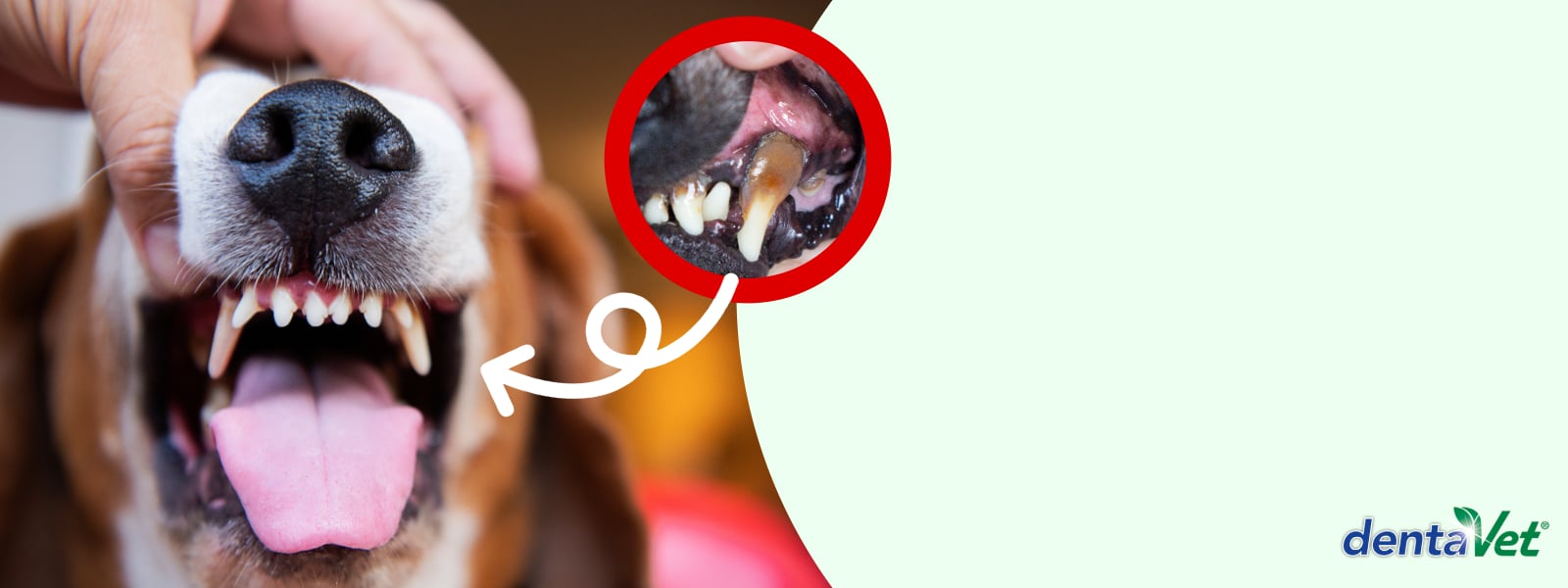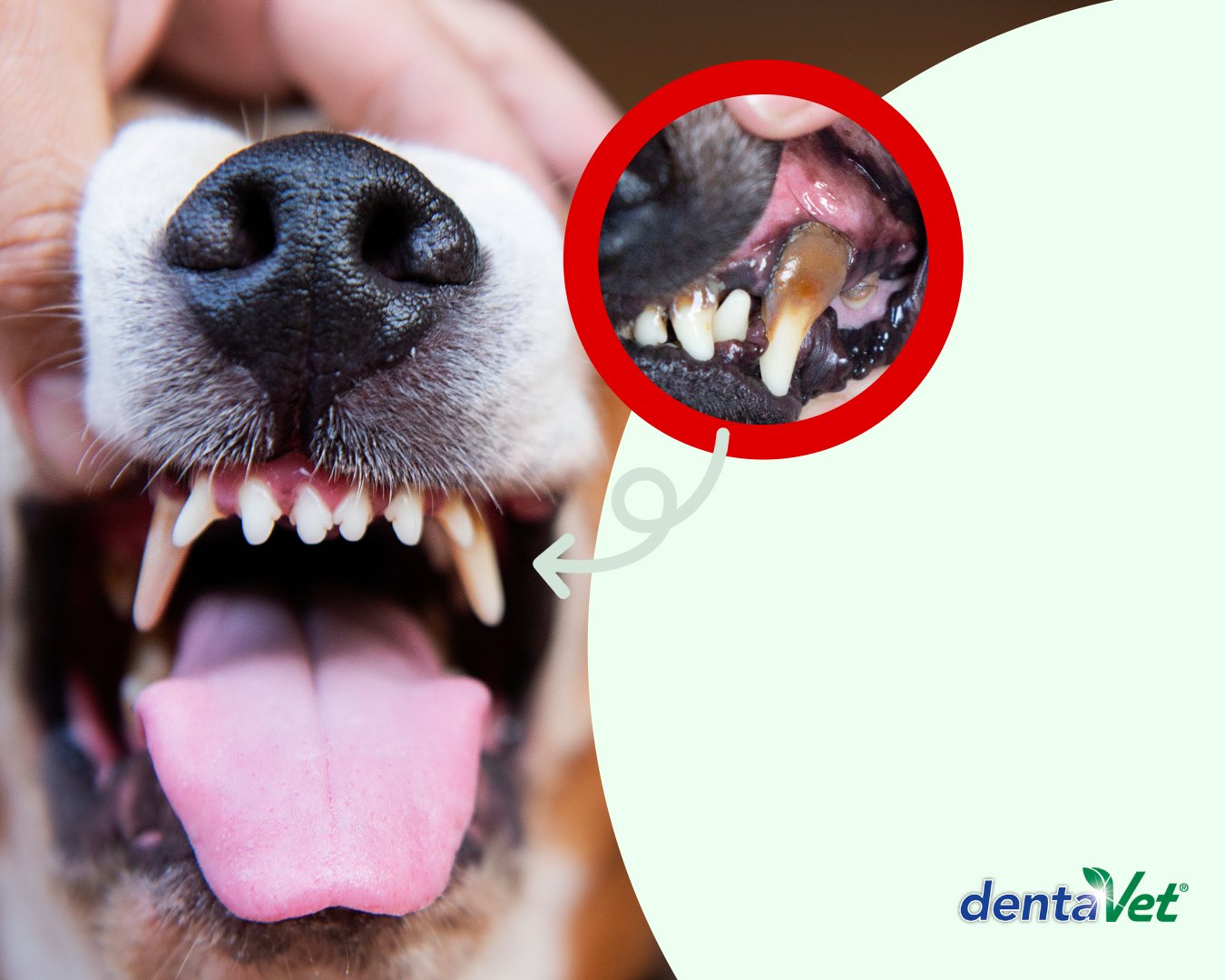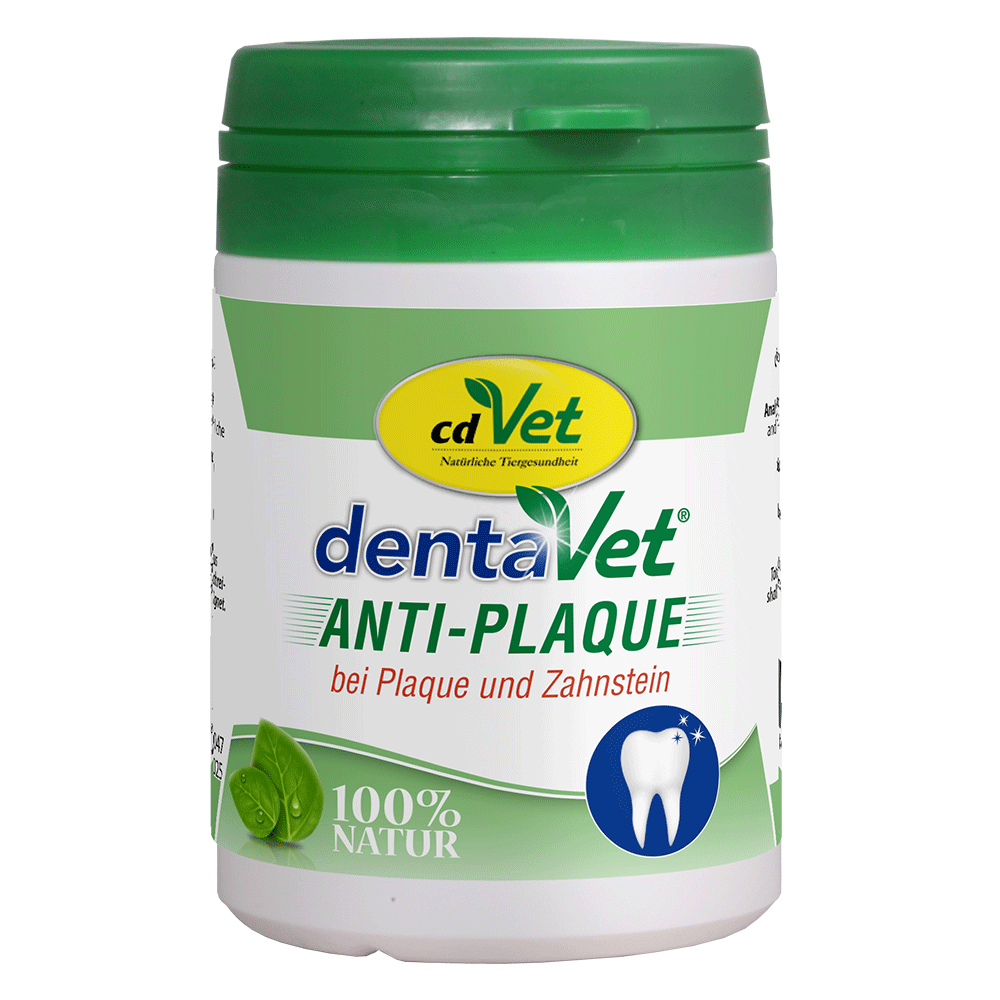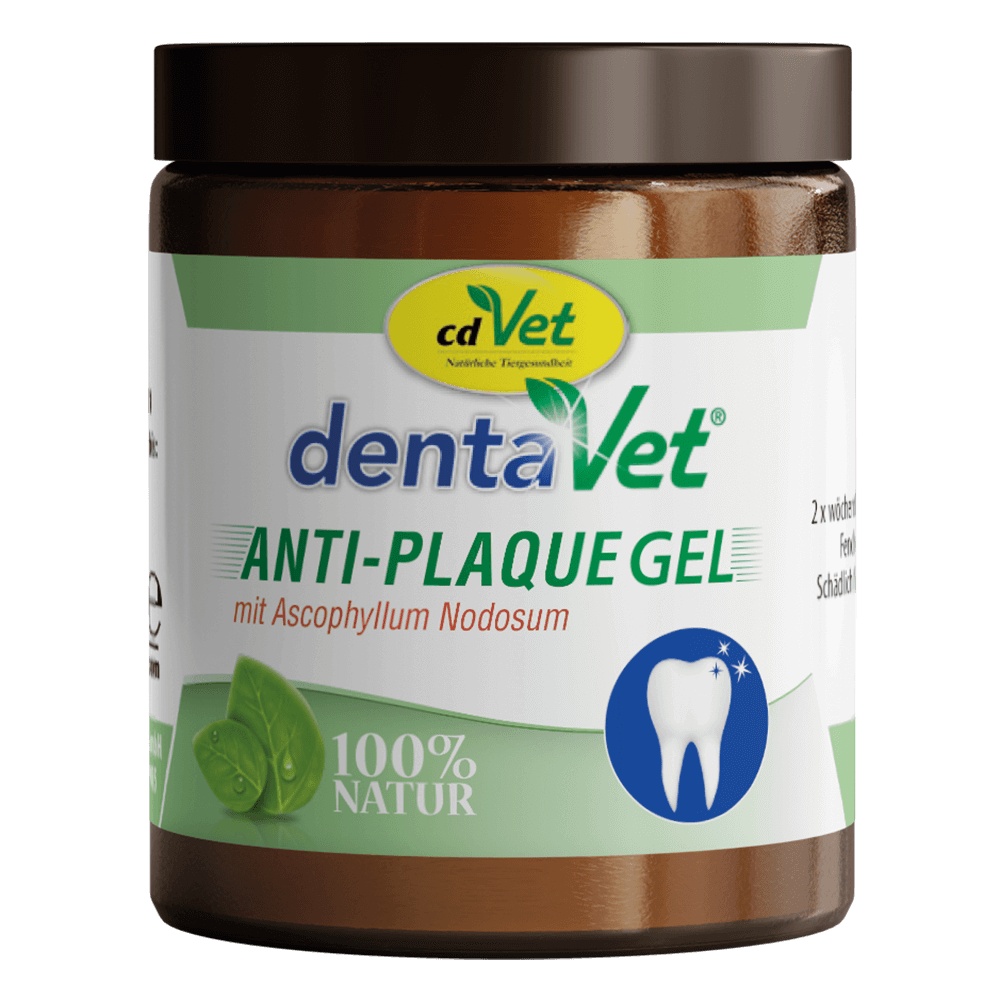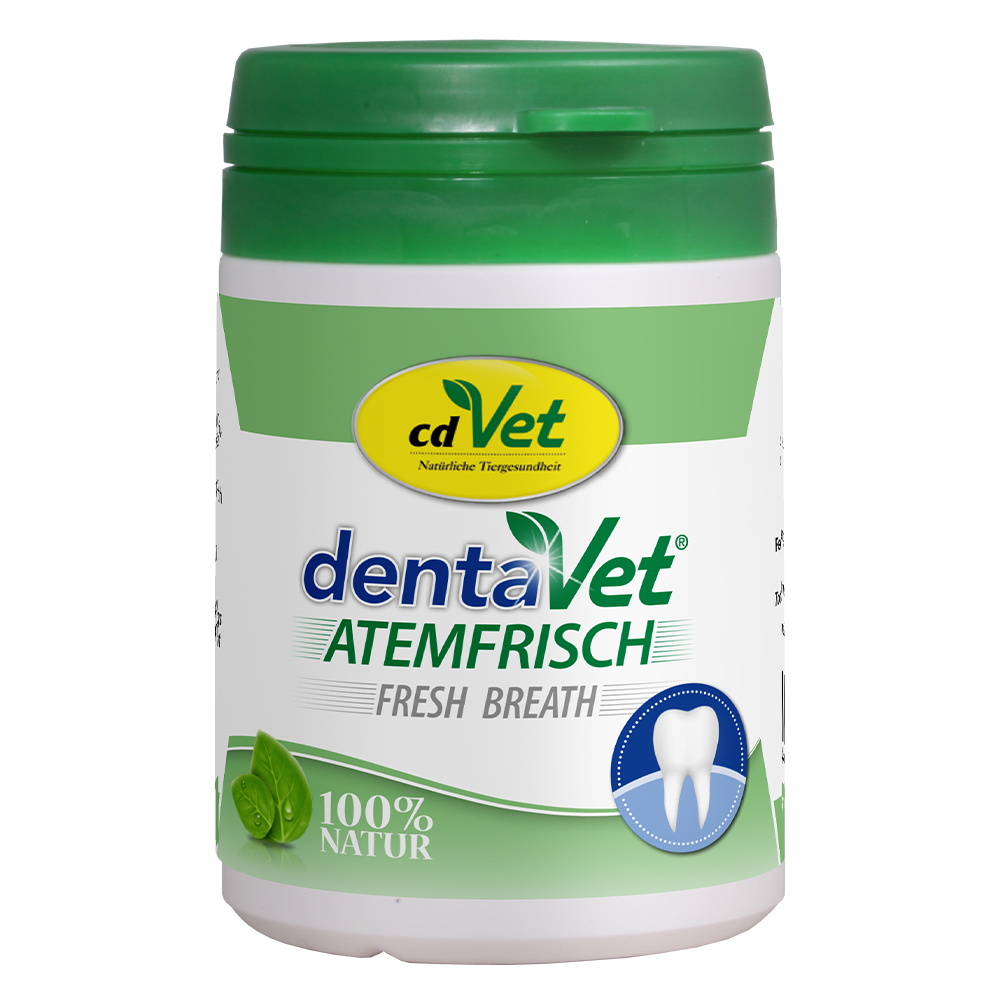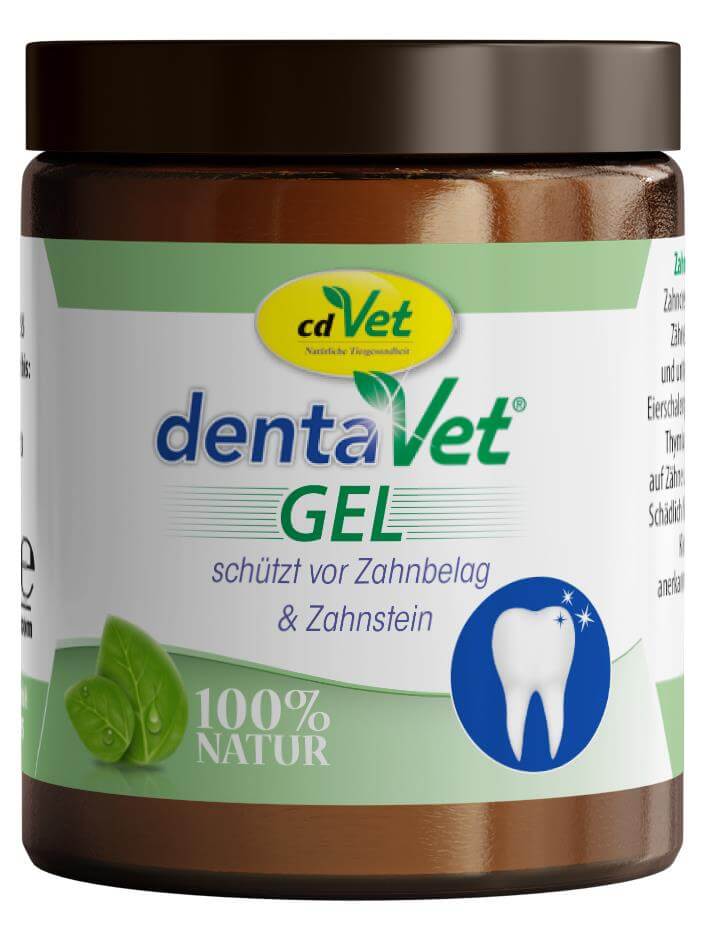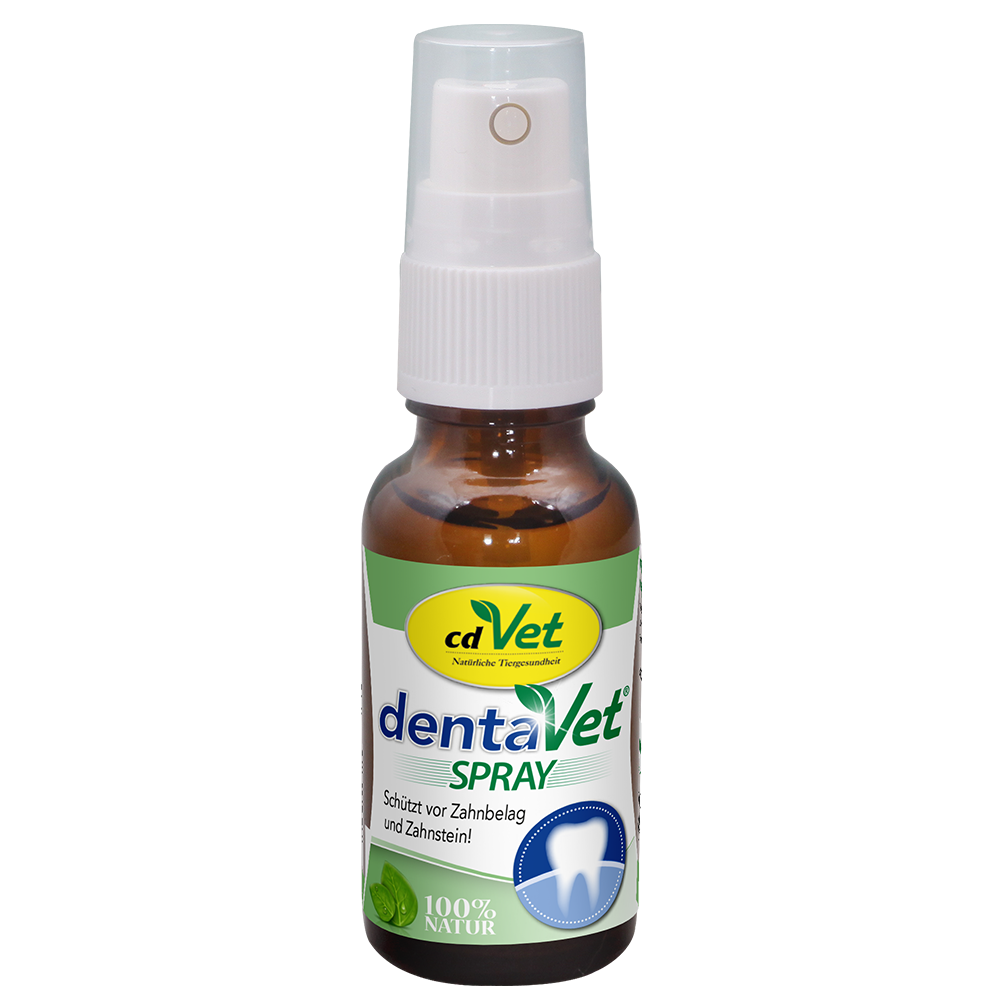Natural Care for Teeth and Gums
A bright white set of teeth, pink gums, and breath without unpleasant odors are, unfortunately, increasingly rare in our pets these days. Especially as our dog or cat gets older, discoloration of teeth and gums often occurs. During every cuddling session, you might find yourself trying not to breathe too deeply to avoid the strong mouth odor of your beloved pet.
Also, in the case of daily grooming of cats, their foul-smelling saliva can sometimes make those who are more sensitive to smells prefer to keep their distance. Here, you can learn what is important for the natural care of teeth and gums.
Understanding the Causes of Bad Breath in Pets
The Role of Bacteria and Fungi
The primary cause of bad breath is usually bacteria and fungi in the animal's mouth. These microorganisms are responsible for plaque formation.
What is Plaque?
Plaque, or dental tartar, is a buildup that contains several layers, including food residues, proteins, carbohydrates, phosphates, and microorganisms. It accumulates on teeth, particularly in areas not reached by natural or artificial cleaning methods.
Consequences of Plaque Buildup
Plaque can lead to dental issues such as caries, periodontitis, and gingivitis. Microorganisms in plaque form a biofilm, producing acids that damage tooth enamel and dentin, leading to caries. Some microorganisms trigger an immune response, causing gum inflammation.
Bad Breath and its Intensification
Some plaque microorganisms produce sulfur compounds, which result in bad breath. This odor intensifies as these microorganisms multiply.
The Formation of Tartar
Over time, plaque absorbs minerals and becomes hard, forming tartar. Tartar provides an additional surface for bacterial colonization, exacerbating dental problems.
Natural ingredients in dentaVet products
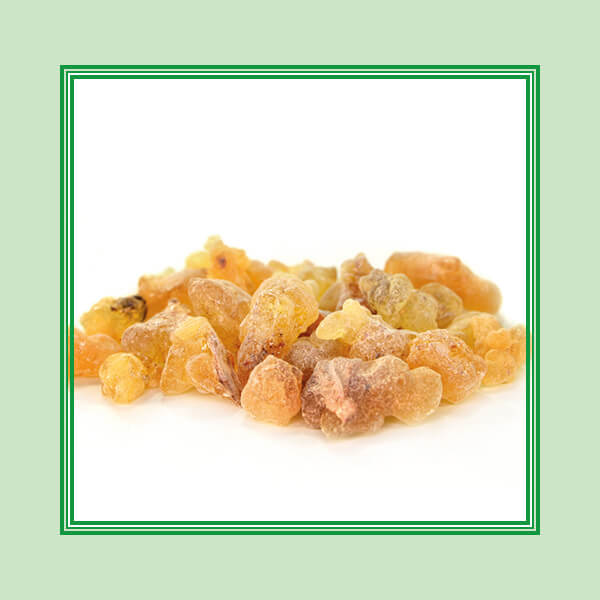
Frankincense
Frankincense has been used for various purposes since ancient times. The first documentation of the use of frankincense for dental care dates back to the thirteenth century. Since then, frankincense has been particularly used for strengthening the gums.
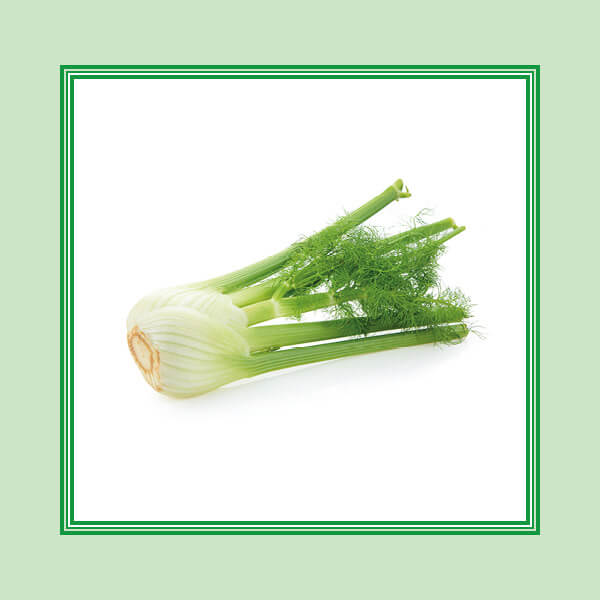
Fennel
In addition to many well-known features, fennel is also recognized for its high content of the essential oils anethole and fenchol. Anethole is traditionally used in human oral care products.
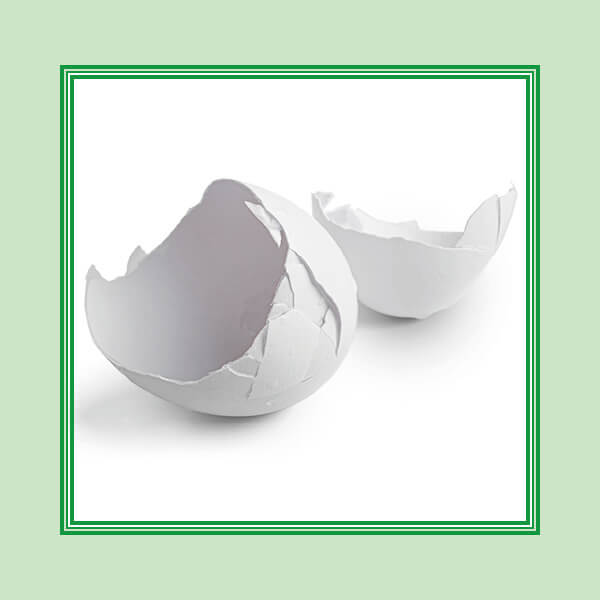
Eggshells
The rougher surface of eggshells provides a gentle abrasion that helps remove dental plaque and discoloration.
How Diet Affects Breath
Diet and Bad Breath
The diet can be a key factor in the development of bad breath. Many commercial pet foods contain synthetic additives, preservatives, attractants, and sugars. Over time, these ingredients can negatively impact the natural oral flora of pets.
Consequences of Dental Issues
When serious dental problems arise, a veterinarian's intervention is often essential. Dental treatments often require anesthesia, which can cause significant stress to the animal's overall health.
Preventive Measures
Regular and sufficient dental hygiene is as crucial in pet care as a species-appropriate diet. To support this, cdVet offers dentaVet Breath Fresh, dentaVet Oil, and dentaVet Gel. These products provide an easy and stress-free way to maintain daily dental care, complementing a healthy diet for optimal oral health.
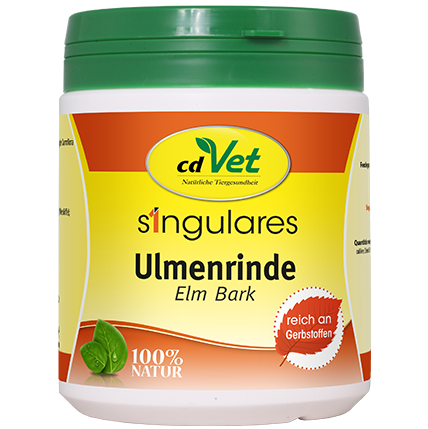
Feed material (powder) for dogs and catsFor the support of the intestinal flora with tanninsThe elm bark is rich in nutrients, minerals and trace elements. Contained bitter and tannins stimulate intestinal peristalsis. The stomach, liver, gall bladder, pancreas and intestines multiply their digestive juices. The self-regulation of the gastrointestinal tract is positively influenced, and digestive complaints can be significantly reduced. A well-functioning digestive system can significantly promote an intact intestinal flora.We use European species for our Singulares Elm Bark (European), which are characterized in particular by the high content of tanning agents and less by the strong mucus formation attributed to the American/Canadian species. In phytotherapy, components containing tanning agents are always the first choice for indigestion associated with diarrhea. Mucous agents are completely unsuitable because, possibly, they may provide an even better breeding ground for the unwanted bacteria. Anaerobic germs, in particular, can reproduce even better under exclusion of oxygen under the mucus, while tannins deprive them of their of livelihood and also inhibit the absorption of toxins in the intestine.Products containing mucous agents can be used in retrospect to alleviate any irritation. Our recommendation cdVet Gastric Protection.Composition: 100% elm bark (ground).Analytical constituents: crude fiber 47%.Feeding recommendation: Mix with water and leave to soak for 10 min. Add 2 g/10 kg body weight daily to the feed. 1 half tsp. corresponds to ca. 1 g.European elm bark does not need to be boiled and does not form slime!Store it cool and dry!
Content: 0.2 Kilogramm (€68.60 / 1 Kilogramm)
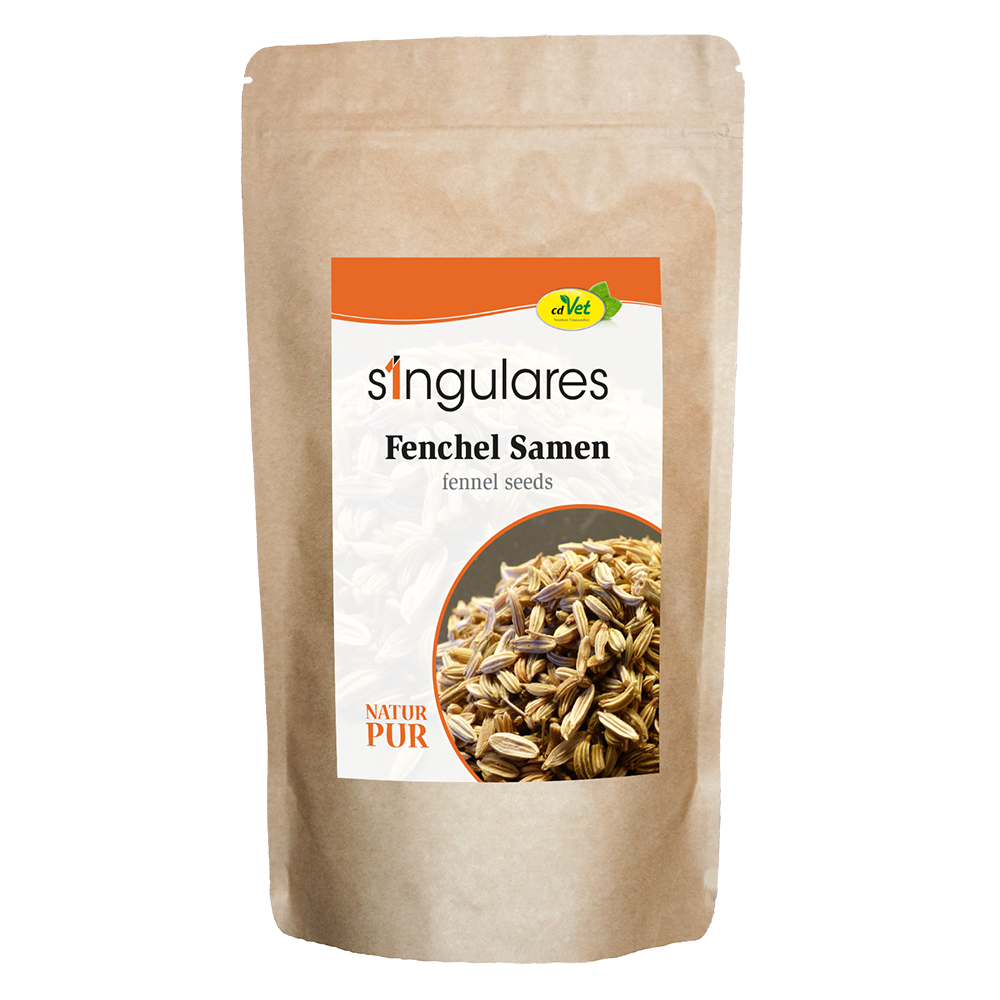
Feed materialComposition: 100% fennel seeds.
Content: 0.22 Kilogramm (€38.45 / 1 Kilogramm)

Feed material for horses.Diet-related defense against insects.Garlic is used by many horse owners as a natural insect repellent.Insect Repellent GarlicIt is known that some horses are more affected, and some are less affected by stinging insects. Based on this, it can be assumed that the odour of the horse must play a leading role when repelling insects.Bugs are attracted by the exhaled carbon and the excreted sweat, which contains lactic acid. This suggests that any nuisance of mosquitoes may have to do with the metabolism in the direction of an acid-base balance.In order to make the characteristic odour and the excretions for the pests as unattractive as possible, we should first and foremost consider a need-based, balanced feeding. Very particular attention should be paid to the nutrients that are essential for good skin structure and a perfectly functioning metabolism. These include in the first place the trace elements zinc, copper, selenium and manganese. They are the basis for healthy and resilient skin and should be fed by a corresponding pure natural mineral feed (EquiGreen MicroMineral), as the content in general feeds is not available in a sufficient quantity.For a feed-related defence against insects, sulphur and its evaporation through the skin seems to play a unique role.For this purpose sulphur-containing herbs, especially garlic, which has a known insect repellent effect, are ideal. All naysaying aside, garlic with its health-promoting effects encourages a natural protection against internal and external parasites in horse feed. Unfortunately, supposedly scientific investigations warn against the use of garlic.Just such a publication in a leading scientific journal, the American Journal of Veterinary Research, where horses were given an excessive overfeeding of garlic with no less than between 120 and 160 grams of freeze-dried garlic per horse per day for a total of 70 days, has been concealed in the media, which has led to upsetting unsuspecting horse owners. 120 grams of dry garlic corresponds to about 6 to 8 tubers of garlic, in other words over 50 cloves of garlic.This absolute overfeeding of garlic led to anaemia, from which the scientists at this time concluded that large quantities of garlic are harmful.To which we would not disagree.However, the fact is that today garlic as a steppe plant belonging to the food spectrum of the ancestors of our horses is completely overlooked. However, no horse would have eaten such amounts as laid out in this study.For skin health an amount of 5 to 20 grams of dried garlic daily is sufficient, depending upon weight. The quantity makes the poison, and in recent years a large number of horses could be protected against the plague of insects thanks to garlic.From the website for the Institute of Veterinary Pharmacology and Toxicology, the toxic dose (poisonous dose) for daily feeding is indicated with 0.2 g of dried garlic / kg body weight of the dried garlic, which corresponds to 2 g of fresh garlic / kg body weight. The maximum average daily dose of fresh garlic or its equivalent is recommended as the following: For cats and dogs: 4g / animal, large ruminants: 20-30 g / animal, horses: 20g / animal.Around 25 years ago, garlic feeding was widespread, and we know from our own experience and from many accounts that garlic is especially an aid, when not every horse in a herd can be supplied with garlic.The horses that are supplied with garlic are significantly less bothered by insects as compared to the rest of the group.To optimise any repellence of insects, an supplementary application of Defence Concentrate has also proven to be very helpful.Composition: 100% pure garlic granules.Feeding recommendation: 20g daily into the feed. Close tightly after use.
Content: 0.3 Kilogramm (€33.87 / 1 Kilogramm)
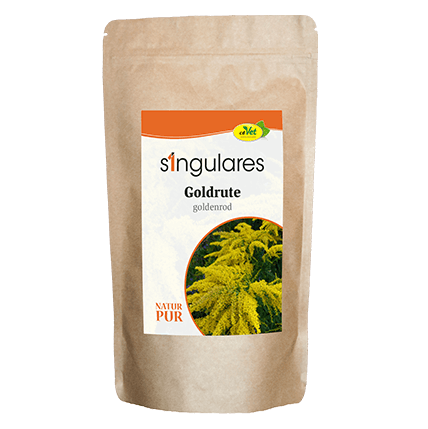
Feed materialComposition: 100% goldenrod herb (dried and cut).Analytical constituents: Crude fiber 27,7%.
Content: 0.1 Kilogramm (€84.60 / 1 Kilogramm)
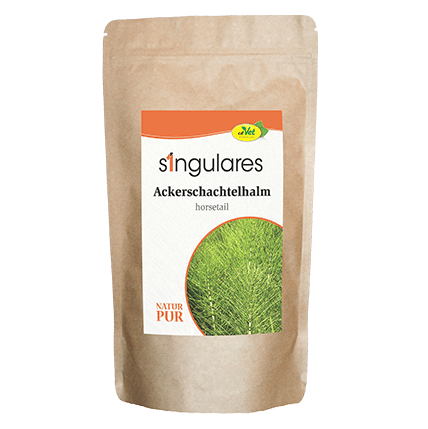
Single FeedComposition: 100% horsetail (cut and dried).Analytical constituents: crude fiber 16.5%.
Content: 0.09 Kilogramm (€94.00 / 1 Kilogramm)
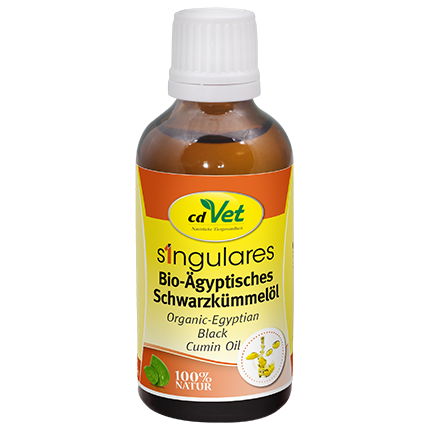
Feed material for horses, pigeons, dogs, and other petsEssential fatty acids as a feed building block for the defense force, for allergies, and for coat and skin problemsRich in valuable, natural vitamins and essential fatty acids, Singulares Organic Egyptian Black Cumin Oil provides important feeding building blocks for defense. It is also used to support strong performance requirements. • Fresh organic black cumin oil from our own manufacture • From premium seeds (Nigella sativa), original Egyptian organic cultivation • High content of unsaturated fatty acids • Feeding-related support of the respiratory tract conditionComposition: 100% pure Egyptian organic black cumin oil (cold pressed).From controlled organic cultivation. Eco-Control-Center DE-ÖKO-001, non-EU agriculture.Analytical constituents: Average fatty acid content: linoleic acid 56.9%, a-linolenic acid 0.3%.Feeding recommendation: Add daily to the feed. Ponies/small horses: 5-10 ml. Large horses: 10-20 ml. Pigeons (in case of increased performance requirements, e.g. before and during breeding, in moulting or before competitions and breed shows): 5-7.5 ml/kg feed. Dogs: 2-6 drops depending on body weight. Rodents/ornamental birds: 1-2 drops.Not suitable for cats!Store it cool and dark! Once opened, use within 6 weeks!
Content: 0.05 Liter (€169.20 / 1 Liter)
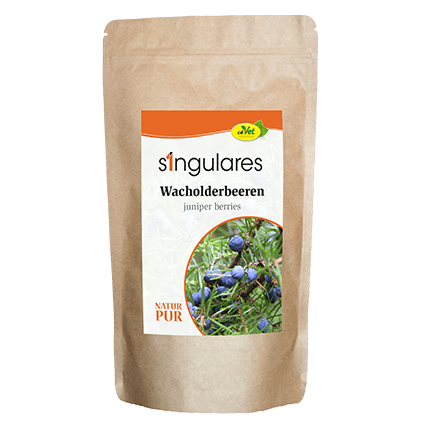
Feed materialComposition: 100% juniper berries.Analytical constituents: Crude protein 19.8%, crude fiber 14%, crude fats and oils 14.6%.
Content: 0.2 Kilogramm (€46.55 / 1 Kilogramm)
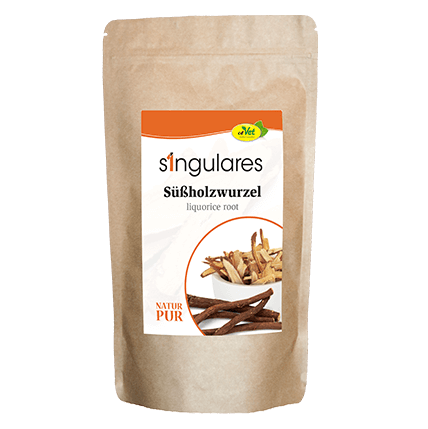
Feed materialComposition: 100% licorice root unpeeled (dried and cut).Analytical constituents: crude fiber 20.1%.
Content: 0.2 Kilogramm (€50.80 / 1 Kilogramm)
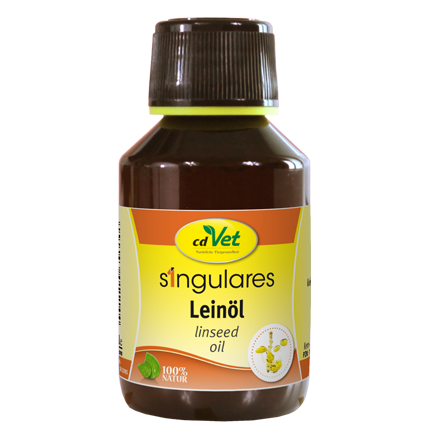
Single feed for dogs, cats, and horsesLike all cdVet oils, Singulares Linseed Oil, obtained from linseed, is a cold-pressed oil of outstanding quality. Its special feature is its extremely high omega-3 fatty acid content of up to 57%. This makes it ideal for balancing the omega-6 to omega-3 fatty acid ratio. Furthermore, linseed oil is an excellent energy source, not just for horses.
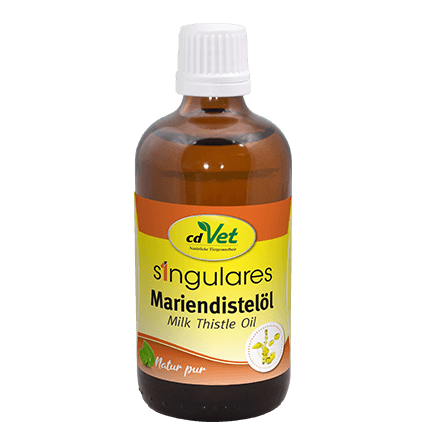
Feed material for dogs, cats, and horsesMilk thistle oil (silymarin-containing feeding oil) to support the liver functionMilk thistle is a medicinal plant widely known for its numerous beneficial properties. Silymarin (a complex of flavonolignans) is the magic word when it comes to the liver and bile supporting properties of milk thistle. This is unique in the plant world and stimulates the production of bile, ensuring better breakdown of nutrients. It also prevents the absorption of toxins through the cell membranes of the liver and binds free radicals. Thus, the liver is supported and promoted in its natural capacity of regeneration.In addition, milk thistle contains high levels of vitamin E, omega-6 and -9 fatty acids. Milk thistle is a readily utilizable source of energy for animals and ensures healthy digestive function.Composition: milk thistle oil 100% (cold pressed).Analytical constituents: Average fatty acid content: linoleic acid 52%.Feeding recommendation: Add daily to the feed. Cats, dogs: 1.5-3 ml/5 kg body weight. Horses: 15-30 ml/100 kg body weight. 1 tsp. corresponds to ca. 5 ml / 1 tbsp. = ca. 15 ml.Once opened, keep refrigerated and dark, and use within 6 weeks!
Content: 0.1 Liter (€42.10 / 1 Liter)
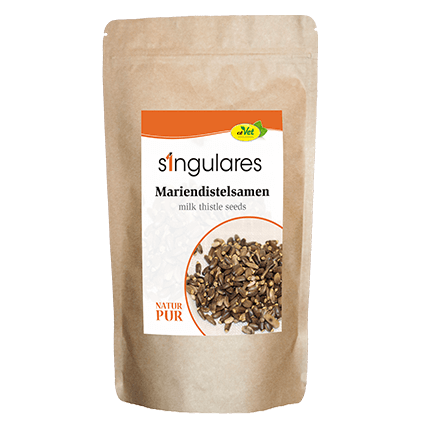
Feed materialComposition: 100% milk thistle seeds (dried).
Content: 0.32 Kilogramm (€37.06 / 1 Kilogramm)
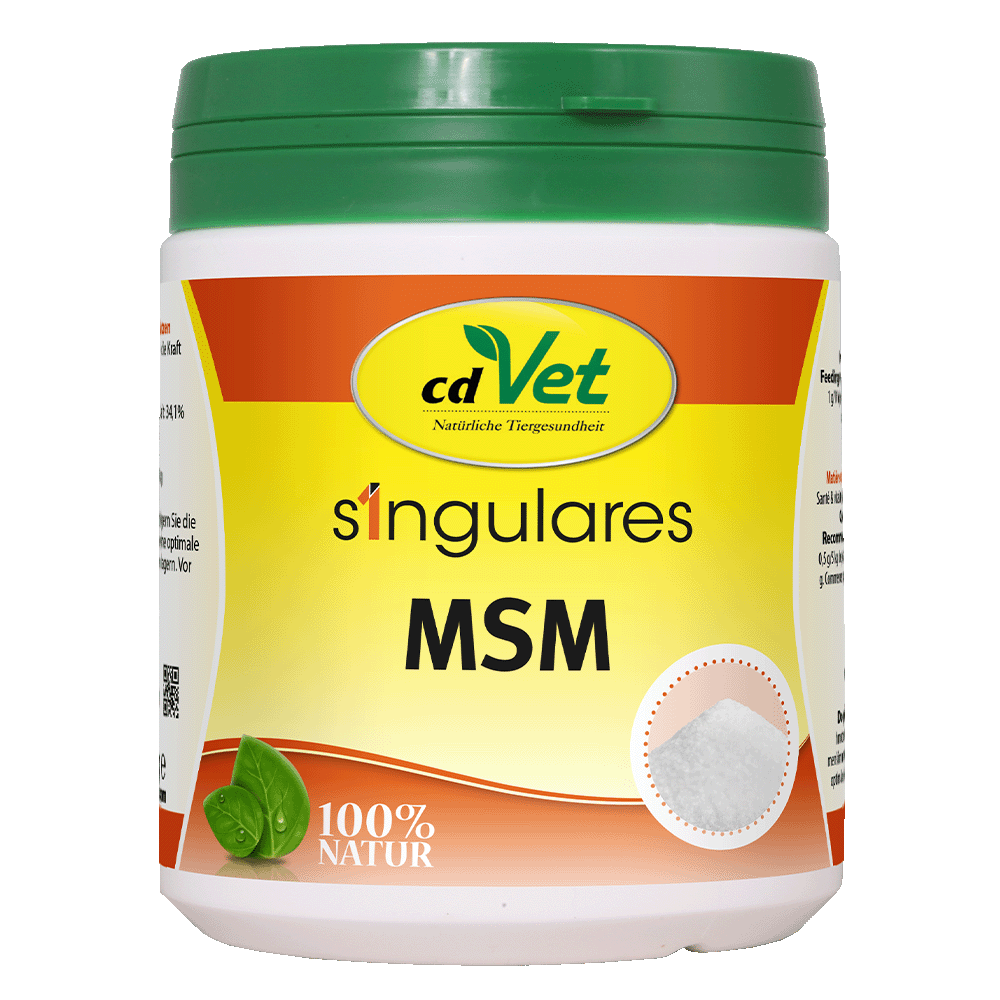
Einzelfuttermittel (Pulver) für Hunde, Katzen und PferdeNatürliche Gesundheit & Vitalität für Ihr Haustier - die Kraft des organischen SchwefelsSchwefel ist ein essenzielles Element, das für viele körpereigene Prozesse benötigt wird. Es ist ein wichtiger Baustein für Proteine, Enzyme und Hormone und trägt zur Bildung von Kollagen und Keratin bei. Dadurch spielt Schwefel eine entscheidende Rolle für die Elastizität von Gelenken, die Regeneration von Gewebe und die Gesundheit von Haut und Fell.Unser Singulares MSM besteht zu 100% aus reinem Methylsulfonylmethan mit einem Schwefelgehalt von 34,1% ohne Zusätze oder Füllstoffe. Es eignet sich ideal zur täglichen Nahrungsergänzung für Hunde, Katzen und Pferde und unterstützt den Körper auf natürliche Weise.Zusammensetzung: Methylsulfonylmethan (MSM) 100%Analytische Bestandteile: Schwefel 34,1%Fütterungsempfehlung: Täglich dem Futter beifügen. Katzen: 0,5 g/5 kg Körpergewicht. Hunde: 1 g/10 kg Körpergewicht. Pferde: Großpferde 10-20 g/Tier, Kleinpferde 5-10 g/Tier. 1 viertel TL entspricht ca. 1 g / 1 TL entspricht ca. 4 g. Beginnen Sie mit einer geringeren Menge und steigern Sie die Fütterungsmenge langsam über einige Tage, um eine optimale Verträglichkeit zu gewährleisten.Kühl und trocken lagern. Vor direkter Sonneneinstrahlung schützen.
